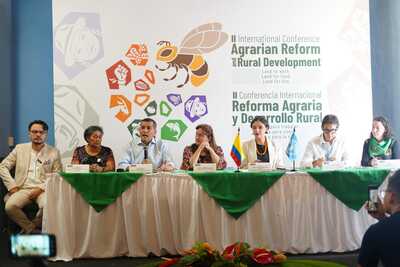On Monday, April 28, the Government of Colombia officially launched the Second International Conference on Agrarian Reform and Rural Development (ICARRD+20), which will be attended by representatives from more than 100 countries and will take place in the city of Cartagena de Indias, beginning on February 24, 2026.
Colombia’s bid to host this event was supported by Brazil, Chile, Cuba, the United States, the European Union, Guatemala, Cameroon, the Congo, the United Kingdom, India, Hungary, Indonesia, a host of other countries, and civil society organizations during the 52nd Session of the Committee on World Food Security (CFS) of the Food and Agriculture Organization of the United Nations (FAO), held in Rome in October 2024.
Members of the International Planning Committee on Food Sovereignty (IPC) – of which La Via Campesina is also a part – also attended and spoke at the event.
Speaking on behalf of the IPC, Nury Martinez said:
“We believe that ICARRD+20 offers a much-needed multilateral space to assess progress in the responsible governance of land, fisheries, and forests, and to agree upon and coordinate effective public policies to address critical issues related to land and commons including: land and resource grabbing; the growing concentration of land; climate change, land degradation, and biodiversity loss; violence against land rights defenders; discrimination against women and girls; and conflict and war.”
She also added that, beyond immediate impacts on communities and territories, and land prices, land grabbing has fueled structural changes in the distribution of ownership and control over natural resources, leading to further land concentration.
Land inequality has increased since the 1980s, driven by factors such as the expansion of large-scale industrial agriculture and economic and trade policies that prioritize global commodity production. As a result, a staggering 70% of the world’s arable land (land suitable for growing crops) is now controlled by only 1% of the largest farms (mostly monoculture) producing a few commodity crops. Meanwhile, farms of less than two hectares make up 84% of all farms but cultivate only 12% of the arable land.
Unequal distribution of land ownership and control also leads to concentrated benefits: the wealthiest 10% of the rural population capture 60% of the value of agricultural land, while the poorest 50% capture only 3%. According to recent research, land inequality directly threatens the livelihoods of some 2.5 billion small-scale agricultural workers, as well as the world’s 1.4 billion poorest people—most of whom rely heavily on agriculture for their survival.
“We believe that ICARRD+20 should carry out a factual and participatory assessment of the progress and setbacks in the respect, protection, and promotion of land and territorial rights for peasants, small-scale food providers, Indigenous Peoples, communities, and workers since the first ICARRD in 2006, the adoption of the Voluntary Guidelines on Tenure in 2012, and the adoption of newer normative instruments such as UNDRIP, UNDROP, and CEDAW General Recommendation No. 34 on the rights of rural women. It should promote and support participatory (multisectoral) national public policy processes that respond to territorial realities, taking into account the diversity of historical and sociocultural contexts.”, Nury added. (Download the full text of the intervention)
Morgan Ody, the General Coordinator of La Via Campesina, who also spoke at the event said,
“From the global peasant movement, we fully support the initiative of the Colombian government to host the 2nd International Conference on Agrarian Reform and Rural Development. We are grateful for the commitment of all states and United Nations institutions that support the ICARRD. Humanity is at a critical moment, facing multiple interconnected crises that threaten its very existence: food crisis, climate and ecosystem crisis, economic and social crisis, geopolitical crisis. With Agrarian Reform, it is possible to face and overcome the multiple crises that threaten humanity’s survival. With Agrarian Reform, it is possible to defeat hunger, because if we as small-scale producers have access to land and water, we are capable of producing healthy food to supply all populations around the world, in both urban and rural areas. In this way, we can achieve food sovereignty.” [Download the full text of the intervention]
The delegates also emphasized that, to ensure effective follow-up to the Conference and a lasting impact, ICARRD+20 must define concrete measures to guarantee the implementation of its recommendations through institutional mechanisms. These mechanisms should operate both within global multilateral spaces — such as the FAO and the CFS — and in regional multilateral coordination platforms. In particular, they should support national and regional processes aimed at advancing agrarian reforms and land policies, promoting accountability, and establishing monitoring systems to oversee States’ compliance with their commitments and obligations under international human rights and environmental law.
In the lead-up to ICARRD+20, social movements, allied civil society organizations, and governments must work together to ensure that peasant communities and other rural populations have access to and control over land, water, and territory — in order to feed the people, cool the planet, and protect the planet’s biodiversity.














